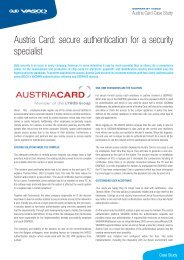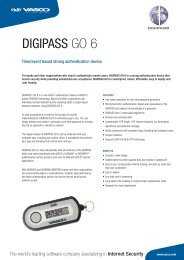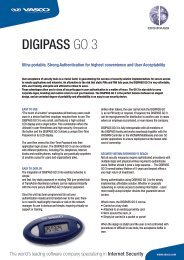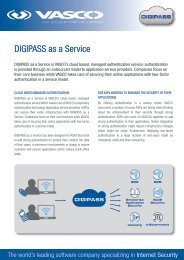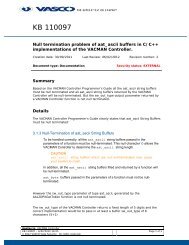Annual Report 2009 (1 MB, pdf) - Vasco
Annual Report 2009 (1 MB, pdf) - Vasco
Annual Report 2009 (1 MB, pdf) - Vasco
Create successful ePaper yourself
Turn your PDF publications into a flip-book with our unique Google optimized e-Paper software.
• Changes in pricing by competitors;<br />
• Our ability to develop, introduce and market new products and product enhancements on a timely<br />
basis, if at all;<br />
• Component costs and availability;<br />
• Our success in expanding our sales and marketing programs;<br />
• Market acceptance of new products and product enhancements;<br />
• Changes in foreign currency exchange rates; and<br />
• General economic conditions in the countries in which we operate.<br />
We also experience seasonality in all markets. These seasonal trends are most notable in the summer<br />
months, particularly in Europe, when many businesses defer purchase decisions.<br />
Our stock price may be volatile for reasons other than variations in our quarterly operating results.<br />
The market price of our common stock may fluctuate significantly in response to factors, some of<br />
which are beyond our control, including the following:<br />
• Actual or anticipated fluctuations in our quarterly or annual operating results;<br />
• Differences between actual operating results and results estimated by analysts that follow our<br />
stock and provide estimates of our results to the market;<br />
• Differences between guidance relative to financial results, if given, and actual results;<br />
• Changes in market valuations of other technology companies;<br />
• Announcements by us or our competitors of significant technical innovations, contracts,<br />
acquisitions, strategic partnerships, joint ventures or capital commitments;<br />
• Additions or departures of key personnel;<br />
• Future sales of common stock;<br />
• Trading volume fluctuations; and<br />
• Reactions by investors to the current turmoil in the world economy and financial markets.<br />
A small group of persons control a substantial amount of our common stock and could delay or prevent a<br />
change of control.<br />
Our Board of Directors, our officers and their immediate families and related entities beneficially own<br />
approximately 28%, with Mr. T. Kendall Hunt beneficially owning approximately 25%, of the outstanding shares<br />
of our common stock. As the Chairman of the Board of Directors, Chief Executive Officer and our largest<br />
stockholder, Mr. Hunt may exercise substantial control over our future direction and operation and such<br />
concentration of control may have the effect of discouraging, delaying or preventing a change in control and may<br />
also have an adverse effect on the market price of our common stock.<br />
Certain provisions of our charter and of Delaware law make a takeover of our company more difficult.<br />
Our corporate charter and Delaware law contain provisions, such as a class of authorized but unissued<br />
preferred stock which may be issued by our board without stockholder approval that might enable our<br />
management to resist a takeover of our company. Delaware law also limits business combinations with interested<br />
stockholders. These provisions might discourage, delay or prevent a change in control or a change in our<br />
management. These provisions could also discourage proxy contests, and make it more difficult for you and other<br />
stockholders to elect directors and take other corporate actions. The existence of these provisions could limit the<br />
price that investors might be willing to pay in the future for shares of our common stock.<br />
21


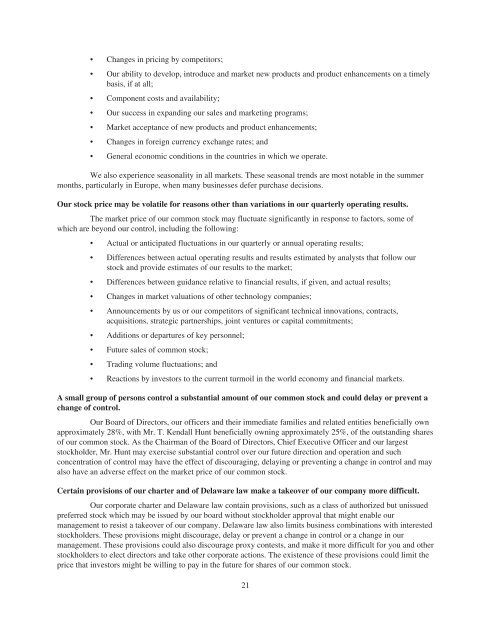
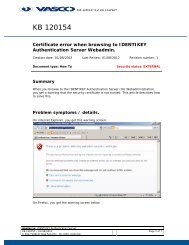


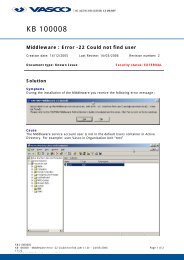

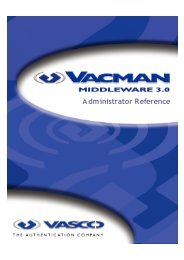
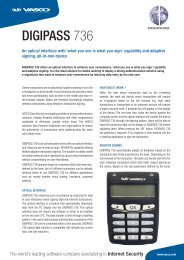
![KB [100006] - Vasco](https://img.yumpu.com/12539350/1/184x260/kb-100006-vasco.jpg?quality=85)
